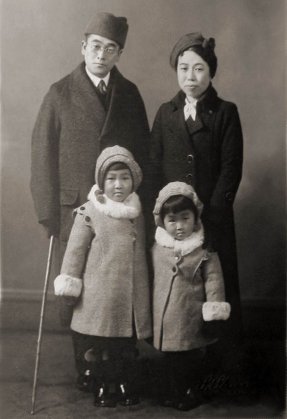 Life record of Imai Yasuko
Life record of Imai YasukoRuth Linhart | Japanologie | Biography project Imai Yasuko| Photographs
 Life record of Imai Yasuko
Life record of Imai YasukoImai Yasuko was born on April 25 th 1933 in Tôkyô, but
spent her childhood in Sapporo on the northern island of Hokkaidô. She
was the second of four children of Imai Genshiro and Imai Yae. Yasuko´s
father was veterinarian and descended from a rich landholder-family from the
Gumma prefecture in Honshû. Her mother originated from a samurai family
from Satsuma in Kyûshû. However, she became adopted at the age of
three years by a sister of her mother and her husband, who could not get
children. Yasuko´s mother grew up in Tôkyô and attended a
French mission school. She and her adoptive father admired the culture of "the
West", which took the role of the "Promised Land" also for Imai Yasuko for a
very long time.
According to her narrations Imai Yasuko was educated
strictly for the task of "good wife and wise mother " (ryôsai
kenbo). Yet she says that she opposed this idea already as a small child
and secretly decided at the age of eight to lead a professional life and not to
marry, since she never wanted to submit to the will of a man and to be grateful
to him for nourishing her. During her school years her career aspirations
ranged from painter to pianist and to authoress.
She can hardly remember
the Japan-China-War and the Pacific War, which accompanied her life until the
age of twelve, but she remembers very well the complete change of atmoshere
with the end of the war. Coeducation, introduced to Japanese schools by the
American occupation forces, changed her life decisively as she recounts. The
intellectual competition and friendships with politically active left-wing
oriented schoolmates released her from her outsider role as "difficult child"
and "strange woman".
Now, in the atmosphere of fundamental change of the
postwar years it seemed possible even for a woman to strive for a self
determined life and a profession which made "self expression" realisable. Imai
Yasuko studied Japanese literature at the Hokkaidô university and was
politically active in the leftist student movement of the national student
organisation Zengakuren in the second half of the fifties. In 1960 the
national movement against the revised US-Japan security treaty, a part of which
was the Zengakuren, broke down. From then on Imai Yasuko immersed
herself in her studies and began to publish about the poet of the Meiji period
Ishikawa Takuboku (1886-1912).
She worked for two years as a high school
teacher in Tôkyô, since still solid barriers opposed the scientific
career of a woman. In 1966 she was appointed to the private university
Hokkaigakuen daigaku in Sapporo, in 1970 to the prefectural
Shizuoka-joshi-tankidaigaku (Shizuoka Women´s College) at
Hamamatsu in central Japan where she remained up to her retirement. In postwar
Japan only for few women a career on a higher university level was possible.
Her private life seems to have always been reset behind her occupational
orientation. She had as she says "five loves". Three of them originated from
the left wing student movement. The relations with her last friend ended after
the year in Vienna 1976 to 1977.
This year she describes as particularly
important, since it aroused her "woman´s consciousness". It was the time
of the second women´s movement which was active in Austria as well as in
Japan. In the seventies, eighties and nineties of the last century Imai Yasuko
strongly criticised the Japanese gender situation and also Japanese women, who
according to her opinion were too easily satisfied with only modest and outward
progress of their situation in the course of the UNO decade of women. Together
with other women she developed a women network in Hamamatsu and published on
different levels to the question of women´ s rights. Apart from Japanese
literature she also taught "joseigaku" (women´s studies), and her final
lecture before retiring on February 4 th 1999 was called: "Why do the Japanese
need women´s studies - in comparison with the Chinese (Nihonjin ni
joseigaku wa naze hitsuyôka - chûgokujin to no hikaku ni
oite)?"
In her later years the contemporary Chinese society and
particularly the situation of modern Chinese women took over the model function
which before the west held for her. Above all it was Imai Yasuko´s
concern to convince young women of the fact, that not marriage but professional
activity and to be economically independent was the basis of a satisfactory
life for women. Towards the end of the nineties rheumatism and Parkinson as
well as other illnesses increasingly hampered her various activities. Today she
lives in a Christian home for elderly people in Hamamatsu. Here she published
in 2003 a collection of her articles about the woman topic: "Women before
daybreak - a collection of my feminist writings (Onnatachi no yoake mae -
watashi no joseironshû)".
Imai Yasuko died on August 28 th 2009
in Hamamatsu.
Publications in German and English
Imai Yasuko, The Emergence of the Japanese Shufu - Why a Shufu Is More Than a "housewife", translated by Lili Iriye Selden, in: Nichibei-josei-janâru, U.S.-Japan Women´s Journal, English Supplement, Number 6, 1994, 45-65
More:
Project description in English
Rethinking Western notions of Japanese women
| Ruth Linhart | Japanologie | Biography project Imai Yasuko | Photographs | Email: ruth.linhart@chello.at |